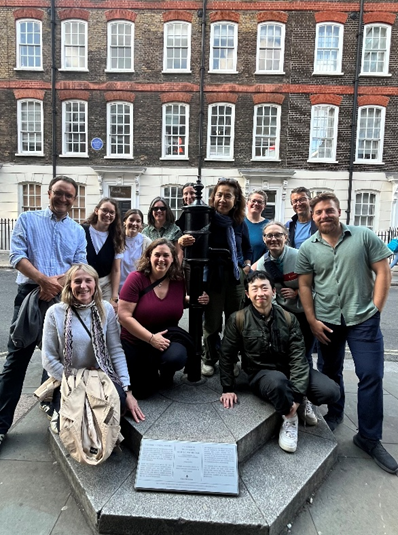Advancing Global Research on Air Pollution, Extreme Weather, and Aging: Highlights from Our Writing Retreat at UCL
Written by: Paola Zaninotto
Published on: Jun 30, 2025
Together with the English Longitudinal Study of Ageing (ELSA) team, I had the honor of hosting an international writing retreat for the Gateway to Global Aging Environmental Exposome Research Group from June 8-11, 2025, at University College London (UCL). Our goal was to advance research on how environmental exposures, including extreme temperatures, shape cognitive, mental, and physical health in older adults worldwide.
Over the past two years, the ELSA team has been working diligently behind the scenes to link detailed environmental exposure data to the residential addresses of study participants. In fact, each participant of these cohorts has been assigned nearly 300 unique measures to characterize the environments around their homes, establishing a solid foundation for this collaborative work.
For this writing retreat, researchers joined us representing cohorts of the Health and Retirement Study International Network of Studies from England, the United States, India, Northern Ireland, Ireland, and Chile, each bringing valuable expertise to deepen our understanding of these complex global challenges.
Showcasing Cohort Progress
We began by sharing updates from leading aging studies, including ELSA, TILDA, NICOLA, LASI-DAD, HRS, and Chile-Cog. Each team presented new findings that link environmental factors such as PM2.5, noise, light at night, greenspace, and temperature extremes with aging-related outcomes. For example, TILDA and NICOLA demonstrated how long-term air pollution affects memory, language, and executive functioning, using harmonized methods for cross-country comparison. Research from HRS revealed that PM2.5, especially from agriculture and wildfires, is associated with increased risks of dementia and poorer physical functioning. Chile-Cog researchers showed that both the intensity and duration of high PM2.5 exposure are important factors for cognitive decline, with patterns varying across Chile’s diverse regions. The LASI-DAD team from India presented innovative work applying machine learning and Google Street View to measure neighbourhood environments, along with new evidence linking pollution and temperature to inflammation and cognitive performance.
Deep Dives and New Insights
Subsequent presentation sessions offered in-depth explorations of key topics related to environmental risks and healthy aging. The HRS team presented work examining how long-term exposure to PM2.5 may relate to mortality. TILDA researchers shared their approach for analyzing how sustained air pollution exposure over a decade could influence changes in cognitive function. Studies from Chile focused on the potential role of greenspace in moderating the impacts of air pollution and on how this relationship might vary under different environmental conditions. The NICOLA team discussed a multi-country project investigating the connection between greenspace and mental health, with a focus on depression in older adults across different regions and living contexts.
The retreat also included presentations on possible biological pathways that link environmental exposures with health outcomes. The ELSA team outlined their analyses of how long-term air pollution and temperature may be associated with levels of C-reactive protein (CRP), an indicator of chronic inflammation. Additional discussions considered how these pathways could differ in various settings, supported by related work from the LASI-DAD study in India.
Writing, Harmonizing, and Building the Future
Between presentations, dedicated writing sessions enabled the team to translate ideas into manuscripts and to refine harmonized methods, ensuring that analyses remain comparable across countries. This harmonization is essential for producing robust, actionable evidence that can inform policy and protect communities.
Evenings spent sharing meals and a group walk to visit John Snow’s historic water pump in Soho helped strengthen the connections and trust that sustain this international collaboration.
Moving Forward
Our time together at UCL reinforced an important truth: addressing the complex challenges of environmental exposures such as air pollution and extreme weather impacts on aging requires rigorous science and genuine, international partnership. By combining diverse data, skills, and perspectives, we are better equipped to understand how environmental exposures affect the aging process and to develop strategies to protect older adults worldwide.
To my colleagues, I extend my heartfelt gratitude for your dedication, insights, and commitment. I look forward to seeing these collaborations flourish into influential publications and, most importantly, into real-world improvements for healthy and resilient aging.

- Paola Zaninotto is a Professor of Medical and Social Statistics at UCL and Deputy Director of ELSA